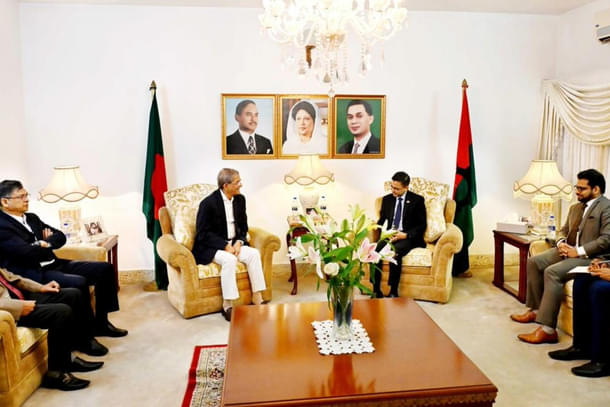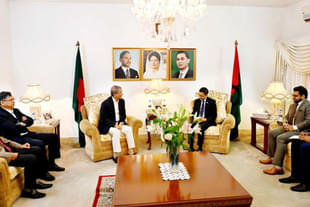World
How India’s Deft Diplomacy Is Helping Recoup Setback Suffered In Bangladesh After Sheikh Hasina’s Fall
Jaideep Mazumdar
Nov 28, 2024, 03:46 PM | Updated Nov 29, 2024, 03:52 PM IST
Save & read from anywhere!
Bookmark stories for easy access on any device or the Swarajya app.


India suffered a severe setback in Bangladesh after the fall of the Sheikh Hasina government on 5 August.
New Delhi, as is well known, had put all its eggs in the Awami League basket, and when Hasina was forced to flee the country, India was left without a friend in the neighbouring country (read this).
The mandarins at Raisina Hill’s South Block (which houses India’s Ministry of External Affairs, or MEA) were caught off-guard by the tumultuous turn of events in Bangladesh.
The Bangladesh Nationalist Party (BNP), which was the principal opposition party during Hasina’s rule, became the primary political player in the country after Hasina’s ignominious exit from her country.
India barely had any links with BNP’s top leadership, who, it must be acknowledged, had made efforts in the past to establish ties with the Indian political leadership, only to have their overtures turned down.
As a result, when Hasina was forced to flee and a new dispensation under Muhammad Yunus assumed office, Indian diplomats in Dhaka found themselves in the high sea.
But, to the credit of MEA’s mandarins, quick moves were made to reach out to BNP’s top leadership. A number of interlocutors were assigned the urgent task of breaking the ice with the BNP.
In the weeks following Hasina’s ouster, the interlocutors worked frenetically behind the scenes to cultivate the BNP leadership. Apart from holding talks with BNP general secretary Mirza Fakrul Islam Alamgir, the interlocutors reached out to BNP acting chairman, London-based Tarique Rehman.
Rehman, senior MEA officials told Swarajya, greenlit the establishment of good ties with India. The son of former Bangladesh president General Ziaur Rahman and former prime minister Khaleda Zia, Rehman is expected to become the next prime minister of Bangladesh after the widely expected BNP victory in the next parliamentary election.
New Delhi conveyed to Rehman and the BNP leadership that it was keen on a course-correction and genuinely interested in ‘permanent good ties’ with the BNP.
“We impressed on the BNP’s top leadership that close ties with New Delhi would benefit both the sides. BNP will also need our support in pushing the interim government headed by Muhammad Yunus to hold elections soon and also to manage its ties with Western countries,” the MEA official said.
The efforts quickly bore fruit because the BNP leadership realised that having India as a friend would help it, as well as Bangladesh.
The first sign of the BNP leadership accepting New Delhi’s outreach and reciprocating was the meeting that the Indian High Commissioner to Bangladesh, Pranay Verma, held with the BNP secretary general and other top leaders at the BNP headquarters in Dhaka on 22 September.
BNP general secretary Alamgir termed the meeting a “turning point” in Indo-Bangladesh ties. He said the BNP leadership had addressed a major concern of India by assuring the Indian envoy that the BNP will not allow Bangladesh to be used for anti-India activities.
“India wants to bring a positive outlook to its relationship with the BNP. They are also seeking to strengthen BNP’s relation with political parties in India. They conveyed that they would like to firm up relations with Bangladesh, especially in the context of the big political change that has taken place here,” Alamgir told reporters after the meeting.
BNP had tried to “reach out to India on a number of occasions,” he added, before the controversial January 2024 election that they (the BNP) had boycotted, but they had not received a response from the Indian side.
“India had placed all its eggs in one basket. Diplomatically, it was not a productive attitude. We always wanted friendly relations with India,” Alamgir added.
The BNP leadership has also provided an ‘iron-clad guarantee’ that the interests of religious minorities, including Hindus, in Bangladesh would be protected.
Even before the meeting with the Indian envoy, the BNP demonstrated its goodwill by deploying its cadres to provide protection to Hindus during the Krishna Janmashtami celebrations late August.
BNP cadres were also mobilised to provide protection to Durga Puja pandals in many places, and the BNP leadership reached out to the Hindu community during that time.
The BNP leadership has been repeatedly stressing that the interests of religious minorities in Bangladesh has to be protected and safeguarded.
In fact, BNP leaders have also urged Yunus to be more proactive in ensuring the protection of religious minorities in the country. That Yunus has ignored the BNP’s advice and caved in to Muslim fundamentalists' wishes is another matter.
The BNP leadership, on its part, wants India to address issues like the huge trade imbalance with Bangladesh, killings of intruders by the Border Security Force (BSF) along the Indo-Bangladesh border, and river water sharing. New Delhi has assured the BNP that these issues will be addressed to Dhaka’s satisfaction when the BNP comes to power.
The BNP has also demonstrated its goodwill by opposing the proposal to impose a ban on the Awami League, as is being demanded by the country’s Islamists, leaders of the students’ movement that ousted the Hasina government, and powerful elements within the Yunus-led interim administration.
On its part, India is silently but strongly backing the BNP’s demand to hold early elections in the country. That’s because New Delhi feels that the longer the Yunus regime stays in power, the more influential the country’s radical Islamists will become and will be able to dictate the government’s agenda.
Another worry for New Delhi is the growing proximity between Yunus and Pakistan. Yunus has demonstrated his affinity towards Pakistan and has openly backed Pakistan’s demand to reactivate SAARC, which is in a limbo over India’s refusal to engage with Pakistan in the multilateral forum over the latter’s use of terror as an instrument of state policy.
The BNP has assured New Delhi that it will keep Islamists at bay and will also keep in mind India’s security interests. They have assured India that it will not allow Pakistan and Pakistani agencies to use Bangladesh to foment trouble in India.
With India’s backing, the BNP is vocal in demanding early elections in the country. Party general secretary Alamgir met Yunus once again Wednesday (27 November) and reiterated the demand for a firm roadmap to parliamentary elections in the country.
The BNP knows that it will need New Delhi’s help in getting Western nations, primarily the United States (US), to lean hard on Yunus to hold parliamentary elections within a specific timeframe, preferably by the middle of next year.
Perhaps the most important gesture made by the BNP is its strong opposition to the demand to ban ISKCON.
The BNP has also slammed the arrest of ISKCON monk Chinmay Krishna Das and said that the arrest was “orchestrated by groups with vested interests.” What the BNP meant was that the arrest was carried out at the behest of Islamists.
The BNP has also called for “free and fair investigations” into the charges against the ISKCON monk.
It has privately urged Yunus to “amicably resolve” the crisis arising out of the arrest and incarceration of the ISKCON monk and warned that “any further provocative action” would lead to communal disharmony and affect Bangladesh’s image on the global stage.
The BNP, thus, is making the right noises and has demonstrated its intent to address India’s concerns, the primary one being the protection of religious minorities in Bangladesh. This is evidence enough that the outreach mounted by the MEA in mid-August is bearing fruit.
Also read: After Hasina's Ouster, India Pays A Dear Price For Putting All Its Eggs In The Awami League Basket





